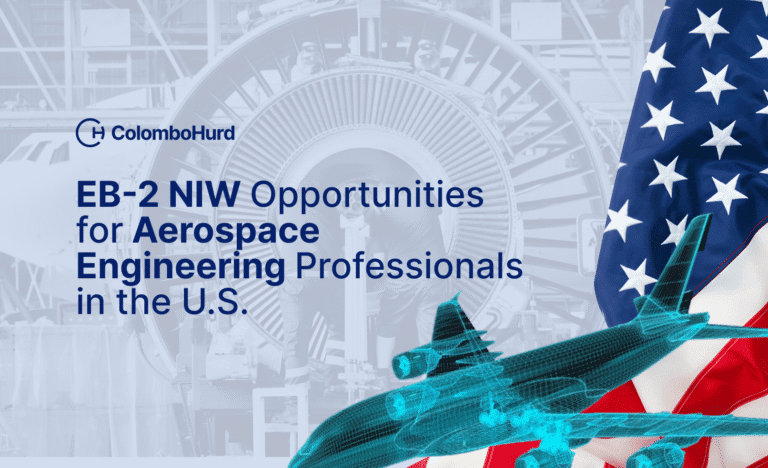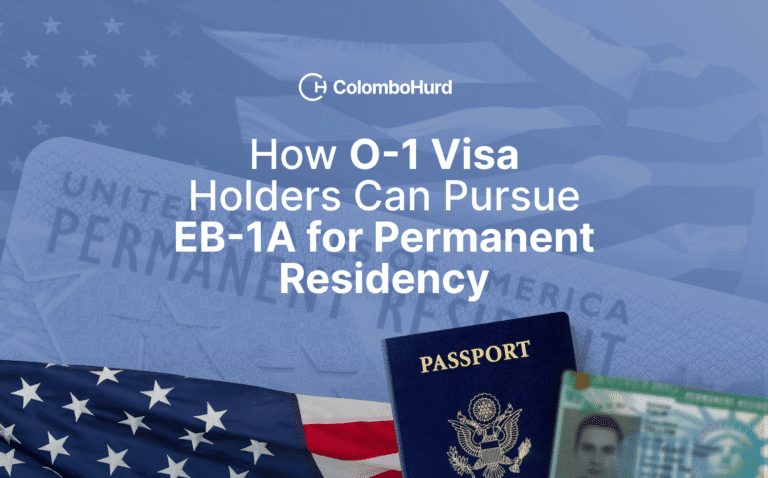The recently signed Executive Order, “Enabling Competition in the Commercial Space Industry” (August 13, 2025), highlights national priorities that aeronautical and aerospace engineering professionals can use to strengthen their EB-2 National Interest Waiver (NIW) petitions. By demonstrating how their work in satellite systems, propulsion, avionics, or aviation safety supports U.S. competitiveness and innovation, aerospace engineers can connect their contributions to a recognized national priority and strengthen their case for a Green Card.
This Executive Order underscores the growing demand for aerospace talent by highlighting that research and development in the commercial space sector directly advance U.S. national security, space innovation, and aviation safety. For aerospace engineers, these priorities provide petitioners with stronger arguments to demonstrate national importance.
Allison McVey, Immigration Attorney at Colombo & Hurd, explains:
“The U.S. is on the cusp of a new frontier in commercial space exploration, as this recent Executive Order shows, and achieving this vision requires the best and brightest minds in aerospace. The EB-2 NIW provides a critical pathway to attract and retain these individuals in the U.S., allowing highly skilled foreign nationals to apply their expertise in the United States and strengthen the nation’s competitiveness in the field.”
Connecting Aerospace Contributions to Federal Priorities
The Executive Order outlines clear national priorities that aerospace professionals can connect their work to when pursuing an EB-2 NIW petition. Key points include:
- Ensuring that new space-based industries, space exploration capabilities, and cutting-edge defense systems are pioneered in the United States rather than by adversaries. Efficient U.S. launch, mission operations, and safe reentry are critical to economic growth, national security, and federal space objectives.
- Enhancing American leadership in space by enabling a competitive launch marketplace and significantly increasing commercial launch cadence and novel space activities by 2030. To achieve this, the Federal Government has committed to streamlining license and permit approvals for U.S.-based operators.
For professionals in aeronautical and aerospace engineering, this means there are clear connections petitioners can draw between their work and U.S. policy goals:
- Apply advanced skills in propulsion, avionics, satellite systems, and space robotics to projects of national significance.
- Contribute to the growth of space exploration, commercial aviation, and national defense industries.
- Align their work with U.S. policy priorities such as strengthening space competitiveness and ensuring aviation safety.
By framing their contributions in this way, petitioners can demonstrate the substantial merit and national importance of their proposed endeavors.
Why Aerospace Engineers Qualify for EB-2 NIW
The EB-2 National Interest Waiver (NIW) is an attractive immigration pathway for professionals in aeronautical and aerospace engineering because it allows professionals to self-sponsor without needing an employer, directly recognizes contributions to U.S. national security and innovation, and provides a clear route to a Green Card.
To qualify, petitioners must demonstrate that their work benefits the United States broadly. In the case of aerospace engineers, contributions often include:
- Advancing satellite communications for defense and commercial use.
- Improving propulsion systems for efficiency and sustainability.
- Strengthening aviation security to protect U.S. airspace.
- Driving innovation in aeronautical supply chains and operations.
For petitioners in these fields, the EB-2 NIW is a pathway to permanent residency that recognizes your work as valuable to U.S. national priorities.
Ms. McVey adds:
“This category is not just limited to research professionals publishing in academia—we are filing successful EB-2 NIW cases for aeronautics and aerospace engineers by demonstrating the clear national importance of their contributions. This includes their importance for scientific and technological innovation, national security, economic competitiveness, and workforce training and development.”
Key Questions About EB-2 NIW and Aerospace Engineering
It emphasizes the importance of space research and development for national competitiveness. Aerospace engineers can align their work with these priorities to demonstrate national importance.
Engineers in areas such as propulsion, satellite systems, avionics, space robotics, and aviation security can strengthen petitions by showing broad U.S. impact.
Projects that expand space competitiveness, improve flight safety, develop advanced propulsion, or strengthen aviation security align well with national priorities.
Real EB-2 NIW Approvals for Professionals in Aerospace Fields
At Colombo & Hurd, we have helped professionals from around the world succeed in EB-2 NIW petitions in the aerospace field. These approvals demonstrate how aerospace engineers and aviation professionals can successfully connect their expertise to the national interest of the United States.
Aeronautical Mechanics Expert from Argentina
This professional’s proposed endeavor was to develop aviation technologies that promote efficiency, technological advancement, and sustainability for aviation systems in the United States. By focusing on next-generation aviation technologies, he positioned himself as contributing to U.S. priorities in modernizing aircraft performance and reducing environmental impact. His technical expertise improves safety and reliability in the aviation sector. Financially, his work supports a stronger U.S. aviation market by making systems more efficient and cost-effective.
Colombian Aeronautical Engineer
This client aimed to improve the safety of air operations and enhance efficiency in aeronautical supply chains across the United States. By ensuring that helicopters and airplanes in both private and commercial sectors are reliable and safe, he demonstrated how his work would boost the competitiveness of the U.S. aviation industry. His petition emphasized both safety and economic impact, showing that stronger supply chains reduce costs and increase efficiency nationwide. The endeavor had clear financial implications, improving access to reliable air services and strengthening the broader aviation economy.
Aviation Management Professional from Colombia
This professional’s endeavor focused on fostering and enhancing aviation security measures in the United States. He proposed strategies to counter and mitigate external threats to air operations while also promoting talent development in the aeronautical sector. By training pilots and crew members through behavioral competency models, his project supported safer, more efficient operations across aviation networks. His contribution also had financial benefits by lowering risks of costly disruptions and safeguarding economic access to secure, efficient air travel.
EB-2 NIW for Aerospace Professionals
In summary, the Executive Order on “Enabling Competition in the Commercial Space Industry” underscores federal priorities that aerospace and aeronautical professionals can reference when preparing an EB-2 NIW petition. By demonstrating how their work in areas such as space research, propulsion, avionics, and aviation safety advances U.S. competitiveness and security, petitioners can make a stronger case for the national importance of their contributions.





